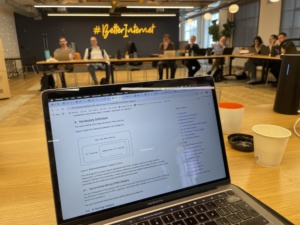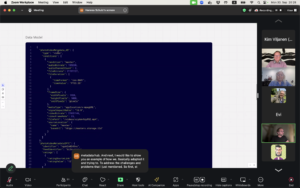Categories
Archives

The IPTC participated in a “design team” workshop for the Internet Engineering Task Force (IETF)’s AI Preferences Working Group. Brendan Quinn, IPTC Managing Director attended the workshop in London along with representatives from Mozilla, Google, Microsoft, Cloudflare, Anthropic, Meta, Adobe, Common Crawl and more.
As per the group’s charter, “The AI Preferences Working Group will standardize building blocks that allow for the expression of preferences about how content is collected and processed for Artificial Intelligence (AI) model development, deployment, and use.” The intent is that this will take the form of an extension to the commonly-used Robots Exclusion Protocol (RFC9309). This document defines the way that web crawlers should interact with websites.
The idea is that the Robots Exclusion Protocol would specify how website owners would like content to be collected, and the AI Preferences specification defines the statements that rights-holders can use to express how they would like their content to be used.
The Design Team is discussing and iterating the group’s draft documents: the Vocabulary for Expressing AI Usage Preferences and the “attachment” definition document, Indicating Preferences Regarding Content Usage. The results of the discussions will be taken to the IETF plenary meeting in Madrid next week, and
Discussions have been wide-ranging and include use cases for varying options of opt-in and opt-out, the ability to opt out of generative AI training but to allow search engine indexing, and the difference between preferences for training and preferences for how content can be used at inference time (also known as prompt time or query time, such as RAG or “grounding” use cases) and the varying mechanisms for attaching these preferences to content, i.e. a website’s robots.txt file, HTTP headers and embedded metadata.
The IPTC has already been looking at this area and defined a data mining usage vocabulary in conjunction with the PLUS Coalition in 2023. There is a possibility that our work will change to reflect the IETF agreed vocabulary.
The work also relates to IPTC’s recently-published guidance for publishers on opting out of Generative AI training. Hopefully we will be able to publish a much simpler version of this guidance in the future because of the work from the IETF.

The IPTC Video Metadata Working Group has released version 1.6 of its Video Metadata Hub standard, including terms for rights usage, language, and content created by Generative AI models.
New properties
-
Rights Usage Terms: The licensing parameters of the video expressed in free text. (Aligned with the equivalent term in IPTC Photo Metadata.)
Changed properties
-
Language: Changed label and description to reflect that this represents the main language of the video. (Previously the term was called “language version”).
-
Source (Supply Chain): Changed description to reflect that changes made be made by a system (such as a Generative AI engine) as well as a person or organisation.
The specification for Video Metadata Hub is separated into two parts: IPTC Video Metadata Hub properties and IPTC Video Metadata Hub mappings showing how to apply these core properties in many existing video standards.
There is also a JSON Schema representation of Video Metadata Hub, which is used by some large media companies in manageing their video content. The 1.6 version of the JSON schema reflects the latest changes.
The Video Metadata Hub User Guide and Video Metadata Hub Generator tool have also been updated to include the changes in version 1.6.
Please feel free to discuss the new version of Video Metadata Hub on the public iptc-videometadata discussion group, or contact IPTC via the Contact us form.
The latest version of NewsML-G2, version 2.35 has been released, adding support for the status of events.
Approved by the IPTC Standards Committee at the IPTC Spring Meeting, on 16th May, the new version adds a property eventStatus which matches the equivalent property in ninjs that was added in version 3.0.
eventStatus, within the eventDetails block, describes the status of an actual event – as opposed to occurenceStatus, which conveys the status of how likely it is that a future event will occur, and coverageStatus, which conveys the planned news coverage of a news event.
The recommended controlled vocabulary for eventStatus is http://cv.iptc.org/newscodes/eventstatus, which currently contains the terms “scheduled“, “in progress“, “completed“, “postponed” and “canceled“.
IPTC Catalog updated to version 41
The IPTC Catalog, the master list of internally- and externally-managed controlled vocabularies used and referenced by NewsML-G2, has been updated to version 41. It adds the PLUS Licence Data Format vocabulary, used extensively in IPTC Photo Metadata and now in other standards through the introduction of the Data Mining vocabulary.
The latest catalog is available at http://iptc.org/std/catalog/catalog.IPTC-G2-Standards_41.xml (note the plain http URL scheme. We don’t link directly to it here because clicking the link may trigger browser warnings about moving from https to http URLs.)
Find out more about NewsML-G2 2.35
All information related to NewsML-G2 2.35 is at https://iptc.org/std/NewsML-G2/2.35/.
The NewsML-G2 Specification document has been updated to cover the new version 2.35.
Example instance documents are at https://iptc.org/std/NewsML-G2/2.35/examples/.
Full XML Schema documentation is located at https://iptc.org/std/NewsML-G2/2.35/specification/XML-Schema-Doc-Power/
XML source documents and unit tests are hosted in the public NewsML-G2 GitHub repository.
The NewsML-G2 Generator tool has also been updated to produce NewsML-G2 2.35 files using the version 41 catalog.
For any questions or comments, please contact us via the IPTC Contact Us form or post to the iptc-newsml-g2@groups.io mailing list. IPTC members can ask questions at the weekly IPTC News Architecture Working Group meetings.
For more information, contact the IPTC News Architecture Working Group via the public NewsML-G2 mailing list.
Categories
Archives
- February 2026
- January 2026
- December 2025
- November 2025
- October 2025
- September 2025
- August 2025
- July 2025
- June 2025
- May 2025
- April 2025
- March 2025
- February 2025
- January 2025
- December 2024
- November 2024
- October 2024
- September 2024
- August 2024
- July 2024
- June 2024
- May 2024
- April 2024
- March 2024
- February 2024
- December 2023
- November 2023
- October 2023
- September 2023
- August 2023
- July 2023
- June 2023
- May 2023
- March 2023
- February 2023
- January 2023
- December 2022
- November 2022
- October 2022
- September 2022
- August 2022
- July 2022
- June 2022
- May 2022
- April 2022
- March 2022
- February 2022
- January 2022
- December 2021
- November 2021
- October 2021
- September 2021
- August 2021
- July 2021
- June 2021
- May 2021
- April 2021
- February 2021
- December 2020
- November 2020
- October 2020
- September 2020
- August 2020
- July 2020
- June 2020
- May 2020
- April 2020
- March 2020
- February 2020
- December 2019
- November 2019
- October 2019
- September 2019
- July 2019
- June 2019
- May 2019
- April 2019
- February 2019
- November 2018
- October 2018
- September 2018
- August 2018
- July 2018
- June 2018
- May 2018
- April 2018
- March 2018
- January 2018
- November 2017
- October 2017
- September 2017
- August 2017
- June 2017
- May 2017
- April 2017
- December 2016
- November 2016
- October 2016
- September 2016
- August 2016
- July 2016
- June 2016
- May 2016
- April 2016
- February 2016
- January 2016
- December 2015
- November 2015
- October 2015
- September 2015
- June 2015
- April 2015
- March 2015
- February 2015
- November 2014